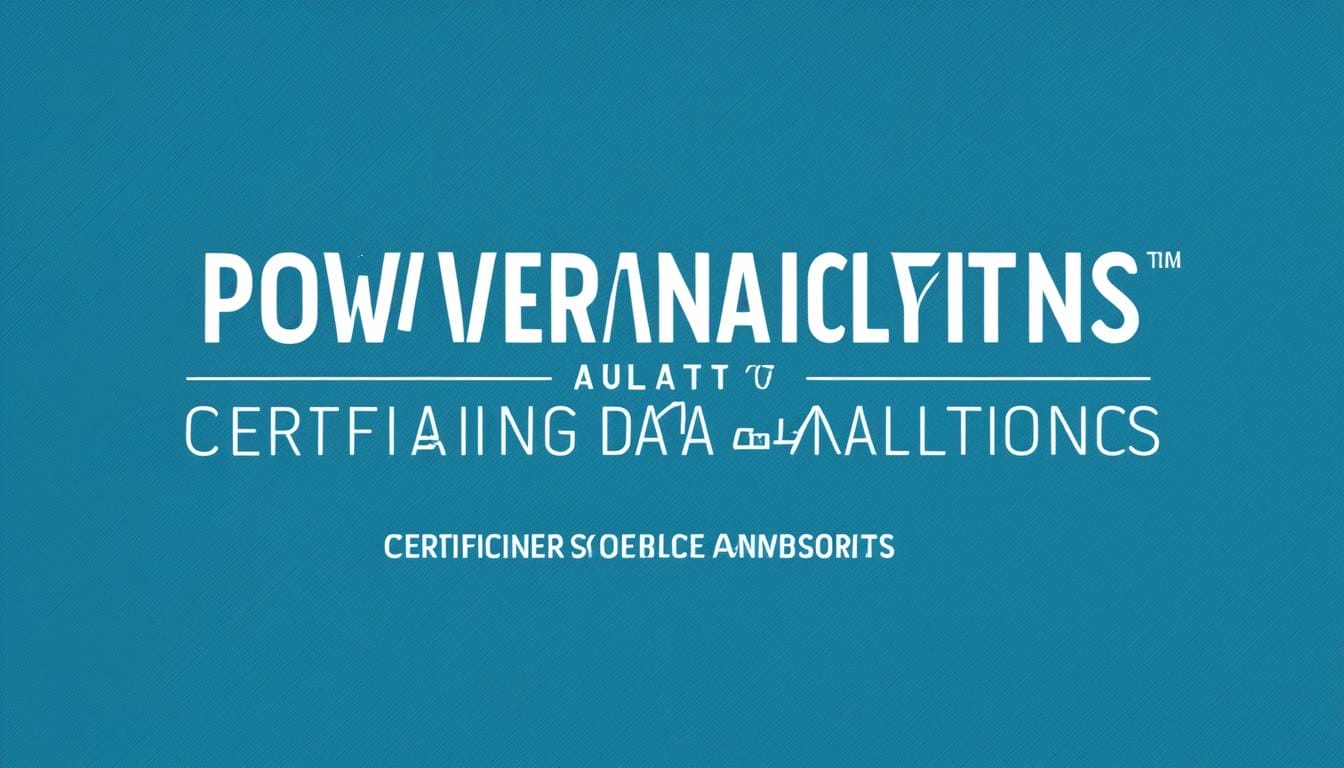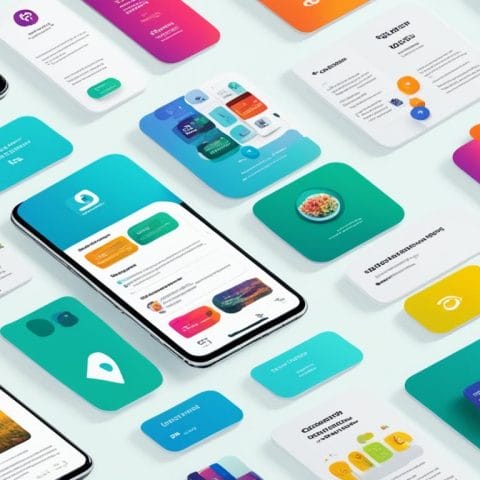Did you know that 50% of customers believe that customer experience is now more important than it was a year ago?[1] In today’s competitive business landscape, delivering personalized experiences is crucial to winning and retaining customers. By harnessing the power of data analytics, companies can unlock valuable insights and create highly tailored customer experiences.
Key Takeaways
- Customer experience is a top priority in today’s business environment.
- Data personalization is a key driver of superior customer experiences.
- Many companies lack access to essential customer data.
- Learning data analytics empowers businesses to personalize customer interactions.
- By leveraging personalized data, businesses can build brand loyalty and increase customer satisfaction.
In the digital age, understanding and leveraging data is the key to success. In the next section, we will explore the importance of data and personalization in creating exceptional customer experiences.
[1]Zendesk Customer Experience Trends Report 2021
Understanding Data and Personalization
Personalization involves tailoring experiences or interactions to customers based on known information about them. By understanding customer preferences and characteristics, businesses can provide customized solutions and enhance customer satisfaction. Let’s explore the different levels of personalization and how they contribute to successful customer experiences.
Types of Personalization:
- Structural Personalization: This level of personalization treats prospects or customers differently based on their background, demographic information, or previous interactions. It allows businesses to provide targeted content and recommendations based on customer segmentation. For example, an e-commerce website may showcase product recommendations based on a customer’s previous purchases or browsing history.
- Micro-Level Personalization: This level of personalization involves directly engaging with customers in a more friendly and familiar manner. It focuses on creating a personalized connection and improving customer relationships. In this case, businesses may address customers by their name in personalized email communications or provide tailored offers based on specific preferences.
Importance of Customer Profiles:
To provide personalized interactions, companies need access to detailed customer profiles. These profiles contain valuable data points about customers, such as their demographics, purchase history, preferences, and behavioral patterns. By analyzing this information, businesses can gain insights into customer needs and preferences, enabling them to make experiences as relevant as possible. Customer profiles serve as the foundation for effective personalization strategies, helping businesses understand their customers better and deliver customized experiences.
Benefits of Personalization:
Personalization offers several benefits for businesses and customers alike. By tailoring experiences to individual preferences, businesses can:
- Enhance customer satisfaction and loyalty
- Increase customer engagement and involvement
- Drive repeat purchases and customer lifetime value
- Improve customer retention and reduce churn
- Boost brand perception and reputation
Through effective personalization strategies, businesses can create meaningful connections with customers, cater to their unique needs, and deliver exceptional experiences that set them apart from competitors. To achieve this, companies must invest in data analytics capabilities, customer profiling techniques, and ongoing learning and training in the field of data analytics.
| Benefits | Description |
|---|---|
| Enhance customer satisfaction and loyalty | Personalization helps businesses exceed customer expectations, leading to higher satisfaction levels and increased customer loyalty. |
| Increase customer engagement and involvement | Customized experiences foster deeper engagement with customers, encouraging them to interact and participate more actively. |
| Drive repeat purchases and customer lifetime value | By delivering personalized offers and recommendations, businesses can encourage repeat purchases and increase the lifetime value of each customer. |
| Improve customer retention and reduce churn | Personalization helps build stronger relationships with customers, reducing the likelihood of churn and increasing customer retention rates. |
| Boost brand perception and reputation | When businesses provide tailored experiences, customers perceive them as more attentive, trustworthy, and customer-centric, enhancing brand perception and reputation. |
What Types of Data Should Companies Collect?

In order to provide personalized experiences, companies should collect various types of data. The type of data required may vary depending on whether the company operates in the business-to-consumer (B2C) or business-to-business (B2B) space. Let’s explore the different types of data that can be collected to enhance personalization:
In the B2C World
For B2C companies, collecting demographic details is crucial. Data such as gender, age, income, education, and location can provide valuable insights into customers’ preferences and behavior. Additionally, information about a customer’s value, tenure, and program memberships can be used for segmentation and analysis. By understanding these aspects, companies can tailor their offerings and communication in a more personalized manner.
In the B2B Space
For B2B companies, collecting firmographic data about the businesses they interact with is essential. This includes information such as industry, size, and customer relationships. Understanding these factors helps in creating targeted and relevant experiences for the company’s B2B clients. Additionally, it is important to consider the primary users of the product or service and their engagement levels to ensure personalized interactions.
By collecting these different types of data points, companies can gain a comprehensive understanding of their customers and tailor their offerings and support accordingly. Support agents can put themselves in the customer’s shoes and provide better service, ultimately leading to improved customer satisfaction and loyalty.
How Should Companies Capture Personalized Data?

Collecting customer data is essential for companies to provide personalized experiences. Data can be collected through various channels, including sales, marketing, product, and support interactions. By capturing and analyzing this data, companies can gain valuable insights into customer behavior and preferences, allowing them to tailor their offerings and interactions accordingly.
A central source of truth for customer profiles is crucial for effective data capture. It ensures that all relevant information about a customer is consolidated in one place, making it easier to manage and utilize. Integrating customer profiles with other systems, such as customer relationship management (CRM) platforms, enables companies to have a comprehensive view of each customer and their interactions throughout the customer journey.
One popular tool for capturing and organizing customer data is a CRM platform. CRM systems not only store customer information but also provide tools for segmentation, analysis, and personalized communication. These platforms allow companies to track customer interactions, analyze trends, and identify opportunities for personalization.
In the SaaS world, data collection often begins before a customer even makes a purchase. Tools like Snowplow capture valuable information about website visitors, including their browsing behavior, preferences, and engagement. This data can then be used to personalize the customer’s experience, even before they become paying customers.
To ensure continuous improvement, it is essential for companies to collect data throughout the customer lifecycle. This includes data from various touchpoints, such as sales transactions, customer support interactions, and feedback channels. By gathering data at every stage, companies can identify areas of improvement, personalize their offerings, and enhance customer satisfaction and loyalty.
Benefits of Data-Driven Education
| Benefits | Explanation |
|---|---|
| Improved Learning Outcomes | Data-driven education allows educators to identify individual student needs and tailor instruction accordingly. By analyzing student performance and engagement data, educators can identify areas of improvement and provide targeted interventions. |
| Personalized Learning | With access to student data, educators can create personalized learning paths that cater to each student’s unique strengths, weaknesses, and learning styles. This personalized approach helps students stay engaged, motivated, and achieve better learning outcomes. |
| Early Intervention | By monitoring student data, educators can identify struggling students early on and provide the necessary support and interventions to prevent further learning gaps. This proactive approach helps students overcome challenges and succeed academically. |
| Evidence-Based Decision Making | With data-driven insights, educators can make informed decisions about curriculum design, instructional strategies, and resource allocation. Data analysis helps identify effective teaching practices, areas that need improvement, and optimize teaching methods for better learning outcomes. |
By adopting data-driven practices in education, schools and institutions can create a more personalized and effective learning environment that maximizes student potential and prepares them for success in the digital age.
How Can Data Personalization Enhance the Customer Experience?
Data personalization is a powerful tool that can significantly enhance the customer experience. By leveraging customer data, companies can create personalized interactions and tailored offerings that resonate with their target audience. Here’s how data personalization can make a meaningful impact:
1. Quick and Personalized Interactions
Establishing authenticated channels and connecting customer-facing teams with customer profiles allow companies to provide quick and personalized interactions. This enables support agents to have access to relevant customer information, leading to a more efficient and effective customer service experience.
2. Targeted Offerings and Promotions
Advanced analytics can help businesses identify customers’ digital steps and preferences. By understanding their behaviors and preferences, companies can deliver targeted offerings, promotions, and communication strategies. This personalized approach increases the likelihood of conversions and customer satisfaction.
3. Integrated Self-Service Options
Personalization can also be integrated into self-service options, such as chatbots equipped with access to customer data. These chatbots can provide personalized recommendations, address specific customer concerns, and guide users through their journey. It empowers customers with the information they need and enhances their overall experience.
“Data personalization builds trust, increases engagement, and leads to higher customer lifetime value.”
When done effectively, data personalization not only enhances the customer experience but also builds trust, increases engagement, and ultimately leads to higher customer lifetime value. By leveraging AI insights and learning outcomes, businesses can optimize their personalization strategies and create exceptional customer experiences that set them apart from the competition.
Understanding Hyper-Personalization
Hyper-personalization takes personalization to the next level by leveraging real-time data and behavioral science to provide context-specific and relevant services to customers. It goes beyond surface-level customization, allowing businesses to tailor their offerings, pricing, and communication to cater to each individual customer’s needs. This data-driven approach enables companies to deliver personalized experiences that meet customer expectations, boost engagement, and ultimately drive business growth.
Delivering Context-Specific Services
Hyper-personalization is rooted in understanding both the manifested and latent needs of customers. By analyzing real-time data, businesses gain valuable insights into customer preferences, behaviors, and desires. These insights enable them to create context-specific and personalized services that resonate with each individual on a deeper level.
For example, consider an e-commerce platform that utilizes machine learning algorithms to analyze a customer’s browsing and purchase history. With this information, the platform can recommend products tailored to the customer’s interests and preferences, increasing the chances of a relevant purchase and enhancing the overall customer experience.
Customizing Offerings, Pricing, and Communication
Hyper-personalization allows businesses to customize their offerings, pricing, and communication strategies to cater to individual customers. By understanding customer preferences and behaviors, businesses can deliver targeted promotions, personalized pricing, and tailored communications that resonate with each customer.
For instance, a subscription-based service can use data analytics to identify a specific customer segment that is price-sensitive. Based on this insight, the company can create personalized pricing plans and offers tailored to the budget and spending habits of each customer within that segment. This level of customization can result in increased customer satisfaction and loyalty.
Driving Business Success
Hyper-personalization is increasingly recognized as a driving force for business success. By providing personalized experiences that meet individual customer needs and desires, businesses can differentiate themselves from competitors and foster stronger customer relationships. This, in turn, leads to improved customer retention, increased revenue, and enhanced brand reputation.
Moreover, hyper-personalization can also drive customer advocacy and positive word-of-mouth, as satisfied customers are more likely to recommend a business to others. By leveraging data analytics and machine learning for hyper-personalization, businesses can position themselves as leaders in their industry and create a competitive advantage.
Unlocking the Power of Hyper-Personalization
To harness the full potential of hyper-personalization, businesses must embrace data analytics and machine learning techniques. Investing in data analytics training and certification, such as a Data Analytics Certification or Machine Learning for Data Analysis courses, empowers professionals with the skills and knowledge needed to analyze customer data, identify patterns, and deliver personalized experiences.
By implementing hyper-personalization strategies, businesses can create a competitive edge in their industry, attract and retain loyal customers, and drive sustainable business growth in today’s data-driven world.
The Need for “Human in Digital”
The Covid-19 pandemic has accelerated the adoption of digital channels across industries, leading to increased customer expectations for “human in digital” experiences. Consumers are seeking more self-service options but often express dissatisfaction with the tools provided to them. Businesses need to prioritize customer-centricity, engage employees, and provide contextually relevant information in real time. This requires a data-driven culture and empathy towards customers and employees.
Creating a Customer-Centric Approach
For businesses to thrive in the digital age, it’s crucial to embrace a customer-centric approach. By understanding the needs and preferences of their target audience, companies can deliver personalized experiences that resonate with customers. Learning data analytics and implementing data-driven education programs can help organizations gather valuable insights about their customers and use that information to enhance the digital experience.
“Learning data analytics and implementing data-driven education programs can help organizations gather valuable insights about their customers and use that information to enhance the digital experience.”
Businesses should invest in training and development programs focused on learning data analytics. This will enable employees to extract meaningful information from customer data and make data-driven decisions. By utilizing tools and techniques such as data visualization and machine learning, companies can gain a deeper understanding of customer behavior and preferences, allowing them to tailor their digital offerings accordingly.
The Role of Empathy
Empathy plays a crucial role in creating meaningful digital experiences. By putting themselves in the shoes of their customers, businesses can anticipate their needs and provide solutions that address them proactively. This requires cultivating a deep understanding of customer pain points and taking steps to alleviate them.
Additionally, businesses should prioritize transparency and communication to ensure that customers feel heard and valued. Regularly seeking feedback and actively incorporating it into the digital experience can help build trust and strengthen the relationship between customers and businesses.
Real-Time Contextual Information
Providing contextually relevant information in real time is another key aspect of delivering a “human in digital” experience. By leveraging data analytics, businesses can track customer interactions and preferences, enabling them to provide personalized recommendations, offers, and support. Understanding the customer journey and tailoring the digital experience to meet individual needs can significantly enhance customer satisfaction and loyalty.
| Benefits of a “Human in Digital” Approach | Examples |
|---|---|
| Enhanced customer satisfaction and loyalty | Personalized product recommendations based on browsing behavior |
| Improved customer retention | Proactive customer support based on individual needs and preferences |
| Increased conversion rates | Real-time chat support with access to customer data for personalized assistance |
By embracing a “human in digital” approach and leveraging learning data analytics, businesses can create seamless and personalized digital experiences that meet customer expectations. This ultimately leads to increased customer satisfaction, loyalty, and business growth. The combination of technology and empathy is key to building strong relationships with customers in the digital landscape.
Ensuring Data Privacy and Security
When collecting and using customer data for personalization, it is crucial to prioritize data privacy and security. Companies should emphasize transparency and clear communication about the purpose of data collection, offer explicit opt-in mechanisms, and implement robust data security measures. Data minimization, easy consent renewal and revocation, clear data retention policies, regular audits, and education about data privacy are also important. It is vital to adhere to ethical data usage principles and have an incident response plan in place.
In today’s digital landscape, where data breaches and privacy concerns are prevalent, ensuring data privacy and security has become a top priority for businesses. By safeguarding customer data, companies not only protect their customers’ personally identifiable information (PII), but also maintain their credibility and trust.
Transparency is key when it comes to data privacy. Companies should clearly communicate their data collection practices, including what data is being collected, how it is being used, and who has access to it. This can be done through privacy policies, terms of service agreements, and consent forms.
Explicit opt-in mechanisms should be provided to give customers control over their data. This means obtaining their consent before collecting any personal information and allowing them to easily opt out or revoke their consent at any time. By giving customers the power to control their data, companies demonstrate respect for their privacy preferences.
Data security measures must be implemented to protect customer data from unauthorized access, use, or disclosure. This includes encryption, firewalls, intrusion detection systems, and regular security audits. Companies should also have policies and procedures in place to handle data breaches and incidents effectively, ensuring a swift response and minimal impact on customers.
Data minimization is an important principle to follow. Companies should only collect the data necessary for the intended purpose and avoid collecting unnecessary or sensitive information. By limiting the amount of data collected, the risk of data breaches and misuse is reduced.
Clear data retention policies should be established to determine how long customer data will be stored and when it will be securely deleted. This helps ensure that data is not kept for longer than necessary and reduces the risk of unauthorized access to outdated information.
Regular audits of data privacy and security practices should be conducted to identify any vulnerabilities or areas for improvement. This can involve reviewing access controls, monitoring data handling procedures, and assessing compliance with data protection regulations.
Education about data privacy should be provided to employees to increase awareness and understanding of best practices. Training programs can help employees recognize potential risks, understand their role in protecting customer data, and follow established data privacy protocols.
Adhering to ethical data usage principles is crucial. Companies should only use customer data for the intended purpose and avoid selling or sharing it with third parties without explicit consent. Respect for customer privacy should be at the core of all data-driven initiatives.
In conclusion, ensuring data privacy and security is essential when collecting and using customer data for personalization. By prioritizing transparency, offering clear opt-in mechanisms, implementing robust security measures, practicing data minimization, establishing data retention policies, conducting regular audits, providing education, and adhering to ethical principles, companies can build trust with their customers and safeguard their sensitive information.
Conclusion
Leveraging data for personalization is crucial in today’s customer-centric business landscape. By understanding and capturing customer data, companies can provide tailored experiences, build trust, and increase customer engagement and loyalty. Personalization allows businesses to connect with their customers on a deeper level, delivering relevant content, products, and services that meet their specific needs and preferences. It enables companies to stand out in a crowded market and create lasting relationships with their customers.
However, implementing effective personalization strategies can be challenging for many businesses. It requires the right technology infrastructure, data analytics capabilities, and a clear understanding of how to translate data into actionable insights. Investing in monitoring and analyzing customer data is essential to uncover valuable insights that can drive personalization efforts.
Segmenting and profiling customers based on their behaviors, preferences, and demographics is another crucial step in the personalization journey. By categorizing customers into specific groups, businesses can create targeted marketing campaigns, offer personalized recommendations, and deliver customized experiences that resonate with each customer segment. Implementing customer relationship management (CRM) personalization strategies can further enhance personalization efforts, ensuring that every customer touchpoint is tailored to their individual needs.
Additionally, incorporating video personalization can be highly effective in engaging customers and delivering personalized messages. Videos have the power to convey emotions, tell stories, and create memorable experiences. By leveraging video personalization techniques, businesses can deliver dynamic and interactive content that captures the attention of their customers, fostering a stronger connection and driving engagement.
In conclusion, leveraging data for personalization is a powerful strategy that can transform the way businesses interact with their customers. By investing in data analytics capabilities, segmenting and profiling customers, implementing CRM personalization strategies, and incorporating video personalization, companies can unlock the full potential of customer data and deliver exceptional customer experiences that drive loyalty and growth.
FAQ
Why is customer experience important in business?
Customer experience is important in business because it serves as a differentiator and can build brand loyalty.
How does data personalization contribute to superior customer experiences?
Data personalization allows companies to tailor their interactions and experiences based on known information about customers, making them more relevant and engaging.
What types of data should companies collect for personalized experiences?
Companies should collect demographic, value, tenure, program membership, firmographic, and usage data to provide personalized experiences.
How can companies capture personalized data?
Companies can capture personalized data through various channels, including sales, marketing, product, and support interactions. A customer relationship management (CRM) platform is also useful for capturing and organizing customer data.
How does data personalization enhance the customer experience?
Data personalization enhances the customer experience by allowing for quick and personalized interactions, targeted offerings and communication, and integration into self-service options.
What is hyper-personalization and how does it relate to data analytics?
Hyper-personalization involves using real-time data and behavioral science to deliver context-specific and relevant services to individual customers. It is a driving force for business success and can be achieved through data analytics techniques.
Why is “human in digital” important for businesses?
“Human in digital” experiences are important because consumers expect self-service options and contextual information in real time. It requires a data-driven culture and empathy towards customers and employees.
How can companies ensure data privacy and security when using customer data?
Companies can prioritize data privacy and security by emphasizing transparency, offering opt-in mechanisms, implementing robust data security measures, practicing data minimization, and educating about data privacy.
Why is leveraging data for personalization important in today’s business landscape?
Leveraging data for personalization is important because it allows companies to provide tailored experiences, build trust, and increase customer engagement and loyalty, ultimately driving business success.
Source Links
- https://www.zendesk.com/blog/leverage-data-personalization-throughout-customer-lifecycle/
- https://www.cxnetwork.com/customer-insights/articles/the-power-of-personalization-leveraging-data-analytics-for-customer-centric-experiences
- https://www.idomoo.com/blog/4-ways-to-leverage-crm-data-for-marketing-personalization/





